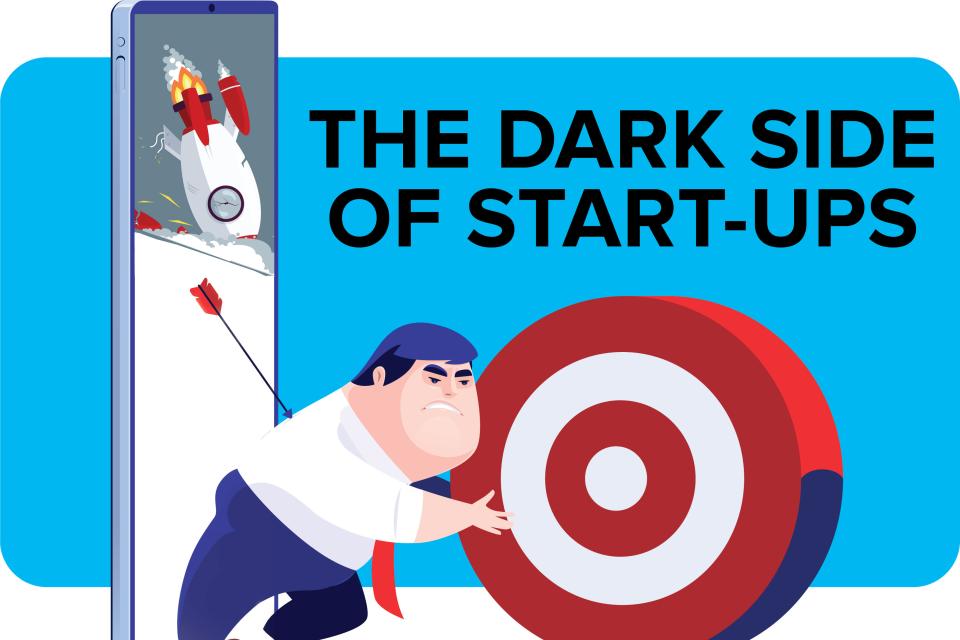The Dark Side of Startups: When "Fake It Till You Make It" Goes Wrong

This article draws on findings from “The unique vulnerabilities of entrepreneurial ventures to misconduct” by UC Davis Professor Donald Palmer and Professor Tim Weiss (Imperial College London).
When we hear of the spectacular rise and fall of once visionary entrepreneurs, we are horrified and enthralled by the excesses of these charismatic founders. How did they get away with it? How did the man behind WeWork manage to sell the “We” part of his branding to his own firm for $6 million? What went wrong?
Common wisdom has it that these are “bad apples”—one-off con men and women who broke the rules and brought their employees and investors down with them. There’s Adam Neumann who convinced investors his WeWork business model—a loss-making startup once valued at tens of billions of dollars—could change the world. Or Elizabeth Holmes, founder of Theranos, now on trial for alleged fraud for claims made by her seemingly revolutionary blood-testing business which was once valued at $9 billion.

With few formal controls, we are relying on an individual’s moral compass to do what is right.
We venerate plucky, visionary entrepreneurs. Business school graduates seek to emulate them and popular culture elevates them to celebrity status. But does the hype around startups encourage bad judgment from those who bankroll them and those who work for them? And if it does, what could help them stay on track?
Rather than being the preserve of a few bad actors, are fraud and a willingness to cook the books more widespread in the startup world than we realize? Are these outliers in fact the result of a systemic issue? This appears, on closer view, to be a failure of scrutiny within the entrepreneurial ecosystem and the result of a “who dares wins” culture which spills over into rule-breaking.
The Allure of Visionaries
Entrepreneurs grab attention if they are visionaries. Neumann sold a unique philosophy promising to rethink the nature of work itself. Holmes told a story of her own fear of needles and the transformative power of Theranos’ diagnostic technology. The greater the potential, the more investment, and the heavier the pressure on entrepreneurs and their ventures to live up to their own hype. And this can create a lack of oversight.
Early-stage investors might be sucked into a business because they know the founder personally or are drawn to a vision, but they may be compromised by a lack of knowledge of a technology or a sector, or by personal connections blinkering their professional judgment. They’ve placed a bet, and are often rewarded with a seat on the board and responsibility for monitoring a business, but are ill-equipped to do the job, and may have little incentive to do it well.
Entrepreneurs bring people on board with personal connections and vested interests—but accountability goes out the window.
Holmes famously recruited former U.S. secretaries of state George Schultz and Henry Kissinger to her board—neither of them experts in medical technology. Both men chose to back Holmes over whistleblowers, even when one employee to sound the alarm was Shultz’s own grandson.
Heavyweights recruited to the Theranos board personally invested and had much to lose—reputationally and financially—if the ship went down, yet these were the very people with responsibility to exercise control and supervise conduct. This is a structural failure—entrepreneurs bring people on board through personal connections and vested interests, but accountability and control go out the window when investors and directors are compromised.
Pushing Boundaries
The dynamism and boldness which startup culture celebrates can be dangerous. This bravado—the “fake it till you make it” and the “fail fast, fail early and fail often”—can be a license for bad behavior. Rule breaking is allowed and positively encouraged – it’s creative disruption after all.
Arguably, it’s this culture that permitted Trevor Milton to release a misleading promotional video apparently showing a truck driving on the road powered by his hydrogen fuel cell startup, Nikola. And this encouraged embarrassed cybersecurity entrepreneur Robert Boback to install fake computer towers with twinkling lights in an attempt to make his company Tiversa’s software appear flashier and more sophisticated.
Startups are not subject to the kinds of oversight that control professions within law, medicine, engineering, education, and more. In the absence of clear boundaries and internal controls, it’s difficult to distinguish when an enterprise tips over from optimism into misconduct. How can you tell when what you are doing is no longer acceptable? With few formal controls, we are relying on an individual’s moral compass to do what is right.
While not all misconduct is so blatant, startup culture enables individuals to justify wrongdoing through anticipation of the ultimate benefits. Cooking the books is the logical conclusion of the combination of pressures, expectations and a lack of checks and balances.
Examples we’ve looked at in our paper are just those which have reached public attention—how many more have passed under the radar? We certainly don’t yet know the whole story, but the problem may be far more widespread than we believe. At a policy level, more oversight may be required. At an individual level, we might need to ask ourselves "how much am I buying into the startup cult? Is this still legal?"
This article originally appeared on the Imperial College Business School website.


